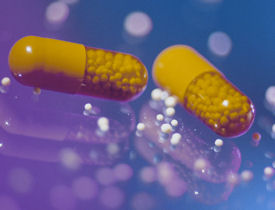Recall of generic drugs, acne cream; depression device OK'd
A summary of approvals, recalls and a record number of deaths and serious injuries reported.
Recalls, warnings, alerts

A recall of Ethex Corp. generic drugs that may contain oversized tablets with too much active ingredient. The recall affects dextroamphetamine sulfate (10 mg); isosorbide mononitrate, extended release (30 mg, 60 mg); morphine sulfate, extended release (15 mg); morphine sulfate, immediate release (15 mg, 30 mg); and propafenone HCl (150 mg, 225 mg, 300 mg). Specific lots are online.
A recall of 1 oz tubes of 10% benzoyl peroxide acne cream marketed as “DG Maximum Strength Acne Medicated Gel,” “Kroger Acne Gel 10% Benzoyl Peroxide Acne Medication” and “Equate: Medicated Acne Gel,” sold at Dollar General, Kroger and Wal-Mart, respectively. Some samples of these products contained Burkholderia cepacia, which can cause infections for people with cuts, scrapes, rashes or weakened immune systems.
A class I recall of several Medtronic intrathecal catheters and intrathecal catheter revision kits used with the implanted Medtronic SyncroMed II, SynchroMed EL, and IsoMed infusion pumps. The pumps have potential misconnections of the Medtronic Sutureless Connector Catheters from the catheter port on the pump, which have resulted in a blockage between the sutureless pump connector and the catheter port on the pump, and disconnection from the pump connector.
A recall of all serial numbers of the HeartMate II Left Ventricular Assist Systems (HM II LVAS) with Catalogue No. 1355 or 102139. Wear and tear of the percutaneous lead connecting the pump with the system controller may interrupt pump function, and has led to 27 pumps needing to be replaced. Five people have died because their pumps couldn't be replaced.
Warnings to Bayer HealthCare about marketing two unapproved aspirin products, Bayer Women's Low Dose Aspirin + Calcium and Bayer Aspirin with Heart Advantage. Bayer Women's is labeled for use against osteoporosis; both are labeled for use in lowering cardiac risk. These uses require a health care professional's supervision, so the products shouldn't be sold over-the-counter.
A warning letter to Lab Corporation of America for marketing OvaSure, a test the company says can detect ovarian cancer, without having FDA approval for the test.
Approvals
Fesoterodine fumarate (Toviaz) for overactive bladder. The 4 mg and 8 mg extended release tablets are available by prescription. Common side effects are dry mouth, constipation, dry eyes and trouble emptying the bladder.
Cinryze, a C1-esterase inhibitor, to prevent hereditary angioedema (HAE) attacks that can occur spontaneously or during stress, surgery, or infection in patients diagnosed with the disease. Attacks can produce rapid swelling of the hands, feet, limbs, face, intestinal tract or airway. The IV drug can be used every 3-4 days for routine prevention.
Akten Ophthalmic Gel 3.5%, a topical eye anesthetic for use in cataract, refractive surgery and Lasik surgery.
The NeuroStar transcranial magnetic stimulation device for treating depressed adults after one antidepressant has failed to work. The treatment uses a magnetic field to induce a small electric current in a certain part of the brain. Unlike electroconvulsive therapy, it doesn't cause seizure or loss of consciousness. It isn't meant to be used with patients who have tried more than one antidepressant.
Silodosin (Rapaflo) to treat symptoms of benign prostatic hyperplasia (BPH). The once-daily capsule is recommended at 8 mg for men without kidney or liver impairment, and 4 mg for those with moderate renal impairment. It's not recommended for men with severe renal or liver problems. Examine patients prior to therapy to rule out prostate cancer. The most common side effect is reduced or no semen during orgasm, but this stops when the patient stops using the drug.
Miscellaneous
A record number of deaths and serious injuries from prescription drugs was reported to FDA in the first three months of 2008, with varenicline (Chantix, Champix) accounting for the greatest number of serious injuries, according to a report by the non-profit Institute for Safe Medication Practices. There were 20,745 new reports of serious injuries and 4,824 deaths during this time. 1,001 new injury cases were from varenicline, including 50 deaths. Heparin was associated with 779 serious injuries and 102 deaths. Many, but not all, of the heparin deaths were due to contamination, while varenicline-related injuries included accidents, falls, suicides and blackouts.


